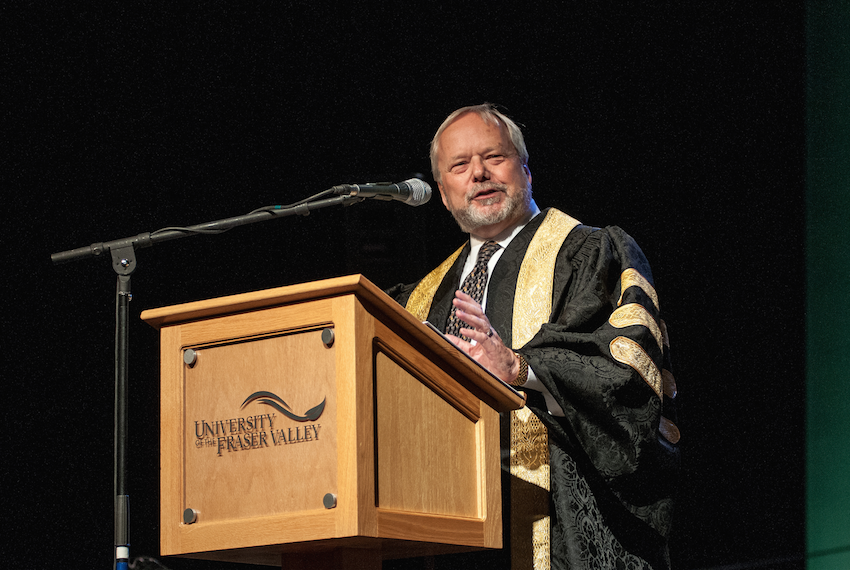By Michael Scoular (The Cascade) – Email
With UFV president Mark Evered retiring at the end of the 2016-17 academic year, work is beginning to search for his replacement.
The university’s Board of Governors is creating a search committee to consider candidates and, finally, make a recommendation for hiring. It will be composed of 13 members: three board members, including the chair, Barry Delaney; the chancellor, Gwen Point; two members of the administration; three faculty members; one staff member; two students; and one alumni member. (The Board will select a member of the executive administration; Senate will select an academic administrator and the three faculty; the Student Union Society will select the students; and the Alumni Association will select the alumnus.)
However, if the search committee proceeds as planned, the scope of updates from here to the hiring date for the public will be limited to public forums hosted by Delaney and a search firm, Boyden Global, and an online survey. The entire candidate process will be conducted in private: “The names of candidates and any information about candidates will be kept confidential by the search committee,” reads a procedures document released by Senate.
Sean Parkinson, the president of the Faculty and Staff Association at UFV, says this is an unnecessary move. (Delaney did not respond to a request for comment by press time; neither did SUS president Thomas Davies.)
In a letter to faculty and staff, Parkinson writes, “Given financial difficulties, it is easy to see how boards might be tempted to hire a president with a corporate orientation who will run the university as a business.”
Parkinson adds, in an interview, that while closed searches are increasingly a trend for Canadian universities, UFV’s specific mandate makes it particularly appropriate — and open searches were the norm at UFV when Skip Bassford, the president who preceded Evered and oversaw the institution’s transformation into a full-fledged university, was hired. As well, open searches are still used to hire deans, the provost, and associate vice-presidents.
“We’re a regionally-focused, teaching-intensive university,” Parkinson says. “I think the community is always important to a university, but where UBC may define their community much broader than just Vancouver … I think we have to be particularly responsive to the Fraser Valley, given that it’s actually in the [university] act and our mandate.”
Parkinson adds that where Boyden Global may be a firm used to serving the corporate world, the world of academia is particularly suited to open searches.
“The common argument against an open process is that candidates don’t want their current employer to know they’re applying for another job … [but] this is not an investment bank. You’re not going to get fired for going to the competition.”
In an open search, short-listed candidates would be encouraged to meet with the community, including faculty, staff, students, and the broader community, take questions, and prove themselves as able to communicate with the people they would be working with as president.
Parkinson notes that where student and alumni groups are represented on the committee, the FSA is not — Senate will choose faculty members.
“I would prefer that the union be able to appoint someone, but the bigger point here is there are not a lot of students and there’s no community members,” Parkinson says.
“I know the bigger you make the tent, the longer things take, but I think it’s a lot safer to go open than closed because I would bet [most] of the time an open process and a closed process would choose the same person. Everyone wants the best candidate. But the closed one generates the suspicion.”
As of the most recent academic year, the president was the highest-paid employee of the university, receiving over $200,000 per year.


